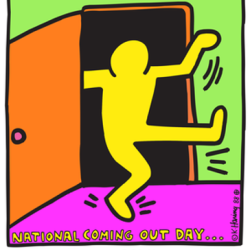LGBTQIA+ History Month occurs annually in October. It was founded in 1994 by Rodney Wilson, a Missouri high school history teacher, and was originally called LG History Month. As identity language has evolved, the acronym has evolved as well, as covered in National Geographic's From LGBT to LGBTQIA+: The Evolving Recognition of Identity.
The month serves as an observance of lesbian, gay, bisexual, transgender, queer, intersex, and asexual history, along with the civil rights movement and the history of gay rights. According to GLAAD, “during the early years, the celebration was largely marked by a call to action and commemoration. But since then, LGBT History Month has blossomed into a national coordinated effort to highlight exemplary role models from the LGBT community" (Source: UCF Today). GLAAD was formed in 1985 to protest sensationalized and homophobic media coverage during the AIDS crisis.
October was chosen to celebrate LGBTQIA+ History Month to coincide with National Coming Out Day (October 11) and to recognize the first National March on Washington for Lesbian Gay Rights on October 14, 1979. LGBTQIA+ History Month now includes Spirit Day, recognized this year on October 19, a day where people wear purple and support anti-bullying efforts towards LGBTQIA+ youth.
October also includes the anniversary of Matthew Shepard’s death on October 12, 1998. Matthew’s murder “would become one of the most notorious anti-gay hate crimes in American history and spawned an activist movement that, more than a decade later, would result in passage of the Matthew Shepard and James Byrd, Jr. Hate Crimes Prevention Act, a federal law against bias crimes directed at lesbian, gay, bisexual, or transgender people” (Source: Matthew Shepard Foundation).

On August 6, 1988, Artist Keith Haring finished drawing this now famous image of a person stepping out of the closet, which he contributed to the National Coming Out Day project.
Ways to Recognize LGBTQIA+ History Month
- Read a book about LGBTQIA+ History. Penguin Random House has compiled a list of nonfiction books that honor the history of the LGBTQIA+ movement in the United States.
- Watch an LGBTQIA+ movie. This list by Rotten Tomatoes contains 200 movies that cross multiple continents, cultures, and genres, and stretches back 90 years to the pioneering German film, Mädchen in Uniform, which was subsequently banned by the Nazis.
- Explore the LGBTQIA+ Studies Resource Guide on the Library of Congress website, which includes resources on LGBTQIA+ politics, history, literature, and the performing arts.
Communication developed by Sara MacKenzie and Jacob Sturtz.
